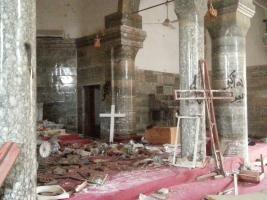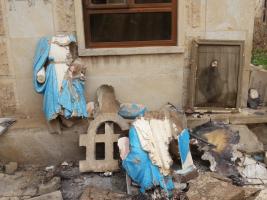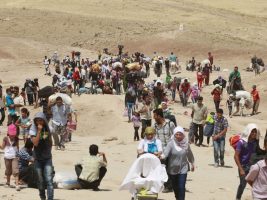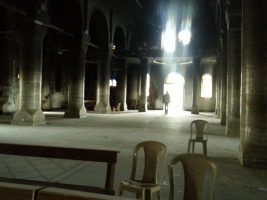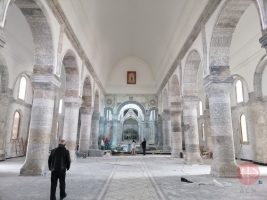
Pope Francis will visit Iraq next 5-8 March, the first by a Pontiff in the land of Abraham, with one of the oldest continuous Christian communities in the world. In fact, many of the episodes narrated in the Bible took place in Iraq: the earthly paradise described in the Book of Genesis, the Tower of Babel, Noah’s flood, the birthplace of Abraham (Ur of the Chaldeans), the meeting of Jacob and Rachel, the lion’s den where Daniel was thrown, the fiery furnace where three young Jewish men were cast by Nebuchadnezzar, king of Babylon, the events of the Book of Esther, the prophetic works of Amos and Ezekiel. Based on the programme, Pope Francis will visit Baghdad, Najaf, Ur, Mosul, Qaraqosh and Erbil.
 An overview of the country. The Republic of Iraq, with Baghdad as its capital, is divided into 19 provinces and is inhabited by 40 million people. The official languages are Arabic and Kurdish and it ranks fifth in the world in terms of oil reserves. Iraq is predominantly a Muslim country, with a Shia majority and a Sunni minority. Arabs are the largest ethnic group, (approximately 75% of the overall population). The Kurdish minority (about 20%) resides in the North of the country, where it gained autonomy with the Kurdish Regional Government (KRG) and where many Christians took refuge. The remaining 5% comprise, among others, Sabean Mandeans, Yazidis, Circassians, Turkmen, Shabaks and Assyrians. The entire Nineveh Plains area, traditionally inhabited by Christians, is among Iraq’s disputed territories, claimed by both the KRG and Baghdad’s central government. The latter presently controls the area.
An overview of the country. The Republic of Iraq, with Baghdad as its capital, is divided into 19 provinces and is inhabited by 40 million people. The official languages are Arabic and Kurdish and it ranks fifth in the world in terms of oil reserves. Iraq is predominantly a Muslim country, with a Shia majority and a Sunni minority. Arabs are the largest ethnic group, (approximately 75% of the overall population). The Kurdish minority (about 20%) resides in the North of the country, where it gained autonomy with the Kurdish Regional Government (KRG) and where many Christians took refuge. The remaining 5% comprise, among others, Sabean Mandeans, Yazidis, Circassians, Turkmen, Shabaks and Assyrians. The entire Nineveh Plains area, traditionally inhabited by Christians, is among Iraq’s disputed territories, claimed by both the KRG and Baghdad’s central government. The latter presently controls the area.
 Christian population in Iraq. There were 1,400,000 Christians (6% of the population) in 2003 (before the US invasion and the fall of Saddam Hussein). The Christian population fell to approximately 300,000 in 2015 and to fewer than 300,000 in 2020. Chaldean Catholics constitute the largest Christian denomination (67%), while Syriac Catholics represent approximately 6.5%. The Armenian, Melkite and Latin denominations are also represented. The majority of Iraqi Christians live in Baghdad, Basra (south) and in the north, in Erbil, Dohuk, Sulaymaniyah, Kirkuk and in the Province of Nineveh, whose Plain has many Christian towns and villages. Iraqi Christians are indigenous Aramaic-speaking people.
Christian population in Iraq. There were 1,400,000 Christians (6% of the population) in 2003 (before the US invasion and the fall of Saddam Hussein). The Christian population fell to approximately 300,000 in 2015 and to fewer than 300,000 in 2020. Chaldean Catholics constitute the largest Christian denomination (67%), while Syriac Catholics represent approximately 6.5%. The Armenian, Melkite and Latin denominations are also represented. The majority of Iraqi Christians live in Baghdad, Basra (south) and in the north, in Erbil, Dohuk, Sulaymaniyah, Kirkuk and in the Province of Nineveh, whose Plain has many Christian towns and villages. Iraqi Christians are indigenous Aramaic-speaking people.
Targeted even before ISIS. The mass exodus of Iraqi Christians began after 2003 and escalated in 2004 with the terrorist attacks on churches in Baghdad and Mosul. On Sunday August 1, 2004, a series of bomb attacks were carried out simultaneously on six churches (in Baghdad and Mosul). Other attacks struck some 30 more churches. Thousands of internally displaced persons (IDPs) fled to the north, which was considered the safest area controlled by the Kurdish Regional Government. After 2006, as attacks on Christians in Baghdad and other cities intensified, the population again fled to areas controlled by the Kurdish government. Attacks continued in 2010.
- Piana di Ninive, chiesa distrutta da Isis – (Foto Sir/Rocchi)
- Piana di Ninive (Foto Sir/Rocchi)
- Piana di Ninive, chiesa distrutta dall’Isis
- Piana di Ninive, Iracheni in fuga da Isis
Until, on June 9 – 10, 2014, Mosul, the second largest city in Iraq, fell to ISIS. The self-proclaimed Islamic State announced the restoration of the Caliphate on 29 June 2014. On July 18, 2014, the remaining Christians left Mosul after having been threatened by ISIS militants and having to “choose” between: “conversion to Islam, death by the sword in case of non-payment of the Jizya, a per capita tax for non-Muslims, or fleeing.” On August 6, 2014, ISIS invaded the Nineveh Plains, forcing some 120,000 Christians to flee to Erbil and to areas controlled by the Kurds.
Concerns for Christians’ safety. ISIS’ military defeat at the end of 2017 led to better living conditions for Christians and other minority groups such as the Yazidi, although security concerns remain since many ISIS fighters have not been arrested and are in hiding. Iranian-backed Shiite militias who helped defeat ISIS are also a cause for concern in the Nineveh Plains. Some Christians, however, have accused them of corruption and human rights violations. Finally, Turkish operations in northern Iraq against Kurdish PKK militants are reportedly affecting various religious minorities, including Christians and Yazidis. At least 25 Christian villages in the north of the country have been depopulated since the beginning of 2020.
 Rebuilding to remain or to return. “Emigration is jeopardising the various Iraqi Churches that are struggling to continue practising their religious rituals despite the exodus of the faithful”, said Alessandro Monteduro, director of ACN Italy. “The only way to strengthen the local Churches and allow the faithful to return and resettle is to rebuild essential infrastructures – houses, schools, kindergartens, churches and parish centres that encourage community life – and to create job opportunities. This is the only way to stem emigration, especially of the young. Unemployment is a serious problem in the Nineveh Plains – the Pope will visit Qaraqosh on 7 March. Although Christians are more likely to form part of the commercial or professional sector compared to other groups, they face discrimination and intimidation by the militias controlling the territories where they live. Thus, unemployment is the second main reason for emigration among young people, albeit less so than security concerns.”
Rebuilding to remain or to return. “Emigration is jeopardising the various Iraqi Churches that are struggling to continue practising their religious rituals despite the exodus of the faithful”, said Alessandro Monteduro, director of ACN Italy. “The only way to strengthen the local Churches and allow the faithful to return and resettle is to rebuild essential infrastructures – houses, schools, kindergartens, churches and parish centres that encourage community life – and to create job opportunities. This is the only way to stem emigration, especially of the young. Unemployment is a serious problem in the Nineveh Plains – the Pope will visit Qaraqosh on 7 March. Although Christians are more likely to form part of the commercial or professional sector compared to other groups, they face discrimination and intimidation by the militias controlling the territories where they live. Thus, unemployment is the second main reason for emigration among young people, albeit less so than security concerns.”
The commitment of ACN. Over the period 2014-2020, ACN donors contributed €48.23 million to support the Christian presence in Iraq, especially in the Nineveh Plains. After ISIS was defeated, said Monteduro, “ACN funding went from providing emergency aid to reconstruction and renovation projects. With the help of ACN, the three main Christian Churches in the Nineveh Plains (Chaldean, Syro-Catholic and Syro-Orthodox) created the Nineveh Reconstruction Committee (NRC) with the aim of facilitating the return of Christians to their communities of origin after the defeat of ISIS and assuring them and other minority groups legal protection and respect for fundamental human rights, notably full citizenship.”
- Infografica Acs
- Infografica Acs
- Infografica Acs
- Infografica Acs
- Infografica Acs
The Syrian Catholic Church of the Immaculate Conception in the city of Qaraqosh, also known as Baghdeda or Al-Hamdaniya, is now a symbol of the reconstruction process. This is where Pope Francis will recite the Angelus prayer on 7 March. The church was severely damaged by ISIS who used it as a shooting range. When ISIS fled in 2016, all the remaining furnishings, manuscripts and prayer books were torched by jihadist militants inside the church. The ceiling was damaged by fire and smoke and the bell tower was razed to the ground with a bomb. Restoration and reconstruction works are virtually complete and the church is ready to welcome the Pope.
- Qaraqosh, cattedrale devastata dall’Isis (Foto Rocchi/Sir)
- Qaraqosh, cattedrale restaurata (Foto Acs)
Great hope in the Pope. The Christian population is placing great hope in Pope Francis’ visit, also on the subject of respect for minority groups. In its dossier, ACN reported that “numerous laws discriminate against Christians living in Baghdad-controlled territory.” One of these is the law on marriage: “it is illegal for Christian men to marry Muslim women unless they convert to Islam.” There is also the issue of parenthood: “even if Christian women can marry Muslim men, their children must be raised in the Islamic faith.” No less worrying is the issue of conversion: “although not officially stated, it is practically illegal for Muslims to convert to Christianity. There are numerous well-documented cases of Muslims who secretly convert to Christianity or seek asylum abroad after their conversion. A convert to Christianity could be prosecuted under the Iraqi blasphemy law, although they are more likely to be killed by their family or by local jihadist militants. Similar problems affect those living under KRG rule.”
 Positive signals. There have been also some positive signs, especially in the area of inter-faith dialogue. In March 2020, the religious leaders of the Iraqi Muslim, Yazidi and Christian communities issued a joint statement emphasising their commitment to peace and expressing solidarity with the victims of the crimes committed by the self-proclaimed Islamic State. In 2020, Christmas was declared an official holiday. Finally, Iraqi protests in late 2019 and 2020 against corruption and political misconduct signalled the end of sectarian divisions that had devastated the country for more than a decade. Catholic religious leaders said that Christians, Yazidis and other minority groups had been allowed to participate in the protest movement in the open. “For years on end we feared that the Christian presence in Iraq was close to extinction”, concluded Monteduro. “We hope to be proved wrong with Pope Francis’ visit that marks the opening of a new chapter for the Christians of Mesopotamia.”
Positive signals. There have been also some positive signs, especially in the area of inter-faith dialogue. In March 2020, the religious leaders of the Iraqi Muslim, Yazidi and Christian communities issued a joint statement emphasising their commitment to peace and expressing solidarity with the victims of the crimes committed by the self-proclaimed Islamic State. In 2020, Christmas was declared an official holiday. Finally, Iraqi protests in late 2019 and 2020 against corruption and political misconduct signalled the end of sectarian divisions that had devastated the country for more than a decade. Catholic religious leaders said that Christians, Yazidis and other minority groups had been allowed to participate in the protest movement in the open. “For years on end we feared that the Christian presence in Iraq was close to extinction”, concluded Monteduro. “We hope to be proved wrong with Pope Francis’ visit that marks the opening of a new chapter for the Christians of Mesopotamia.”

